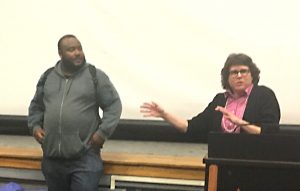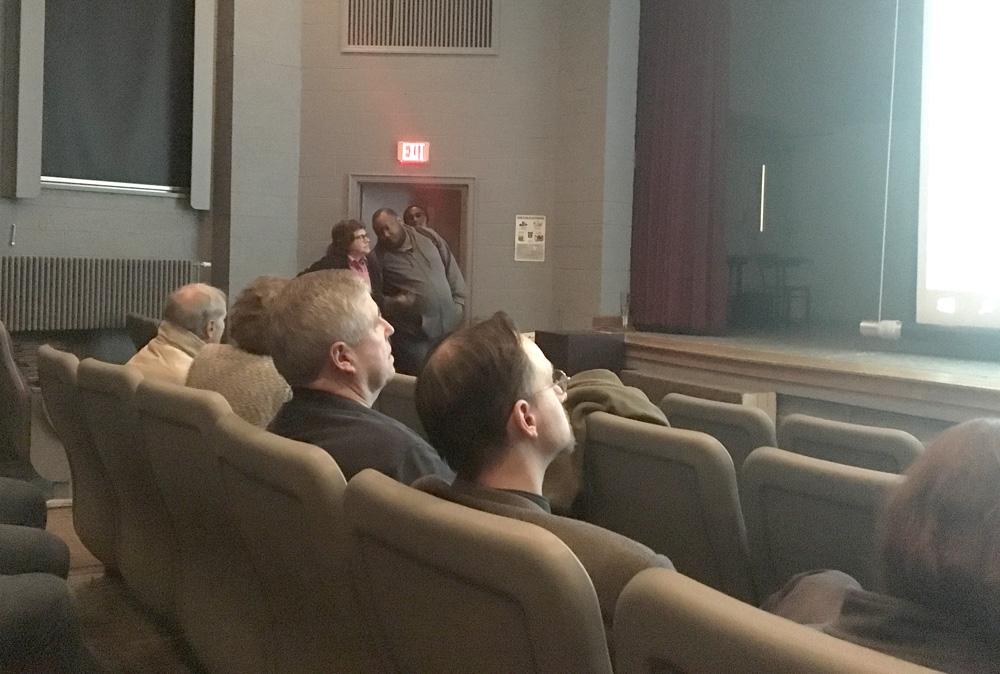On Feb. 27, Appalachian State University hosted Christopher Everett’s documentary “Wilmington on Fire,” which documents the Wilmington coup of 1898.
“‘Wilmington on Fire’ chronicles the bloody attack on the African-American community that unseated elected officials in the port city of Wilmington, North Carolina, on November 10, 1898,” according to the description for the movie. “The massacre and coup d’etat was the springboard for the white supremacy movement and Jim Crow segregation throughout the state of North Carolina and the American South.”
The film tells the story of the coup through interviews with researchers of the topic and descendants of the victim of the coup. These interviews explain to the audience the climate leading up to the coup, the cause and perpetrators, the events of the coup itself and the aftermath for the black community in the wake of the coup.
After the film was shown, Beth Davison, the director of Interdisciplinary Studies, introduced Everett and Larry Reni Thomas, one of the researchers interviewed in the film, for a Q&A session with the audience.

One of the first questions asked was whether Everett and Thomas believed that schools were focusing on the coup enough.
“You have teachers that actually are out there more than ever actually teaching this history in North Carolina,” Everett said. “We get teachers hitting us up all the time, you know, with K through 12, high school, college, saying, ‘Hey, we’re starting to teach this now.’”
He said he believes that his film has been helping in the push to educate youth in North Carolina on what happened in Wilmington in 1898. Not only this, but Everett also told the audience that his film has had effects elsewhere.
“This has really brought this story to life again, this history to life again,” Everett said. “It’s actually gotten people to actually consider reparations for the first time I’ve ever seen, you know, white and black.”
During the Q&A session, Everett and Thomas were also asked how reparations might be gained by the descendants.
“We just need need a lawyer, to work pro bono preferably, to work on this case, because I mean Donald C. Miller was robbed,” Thomas said. “Donald C. Miller was a financier who actually was a slave, and he rose so quickly through the ranks. He was a wealthy man.”
Thomas then described the wealth that had been acquired by the black community in Wilmington before the attack and how those who had been wronged were what the film was focused on. Everett also spoke about what attempts at reparations had been made in the past.
“When they did the state report back in 2008, they really kind of started coming out with this commission and developed a series of bills, and one of those bills was to compensate people like Dr. Manly and the descendants of people who had actually lost,” Everett said.
He also described other initiatives that were introduced, including the creation of a travelling exhibit and a documentary describing the events.
“None of this stuff got passed, not even teaching this in schools,” Everett said.
“Wilmington on Fire” is Everett’s first film. He began working on it in November 2011, and it was released to the public in 2015.
The documentary, which was released in 2015, has won several awards including the 2015 Cucalorus Film Festival award for Best Documentary and the 2016 FilmSPARK awards for Best Documentary. It is also Everett’s first foray into filmmaking.
When asked what inspired him to make this film, Everett said he had always been a history geek and he wanted to make films of his own.
“I saw that no one had done a documentary on it, and I said you know what, I’m going to take the initiative,” Everett said. “And also I looked back on what those people had been through in 1898 and how they came up from nothing, you know and put their resources together, so I said ‘hey, I can do it too.’ That’s what gave me the confidence to really do this.”
Thomas, a Wilmington native and current resident of Chapel Hill, also described what first interested him in researching the Wilmington coup. He said that he had always known that there was something wrong with the town, but he could never figure out what it was. Only after doing research in graduate school on other attacks on the black community in Wilmington did Thomas identify what happened.
“I knew there was something strange about Wilmington, and I said ‘well this is it, this is why it’s such a strange, strange place,’” Thomas said.
The film was brought to the university through the efforts of Multicultural Student Development, the Department of Sociology, the English Department, the Department of History and the Interdisciplinary Studies Program.
After the success of “Wilmington on Fire,” Everett said that he is currently working on a shorter documentary about karate master Victor Moore. When asked about doing anything else related to “Wilmington on Fire,” Everett said that he is looking into making a part two that will allow him to expand the story and tell more about the coup.
Story and photos by: Q Russell, Opinion Editor
Featured Photo Caption: Audience watches “Wilmington on Fire”, created by Christopher Everett, in I.G Greer.

